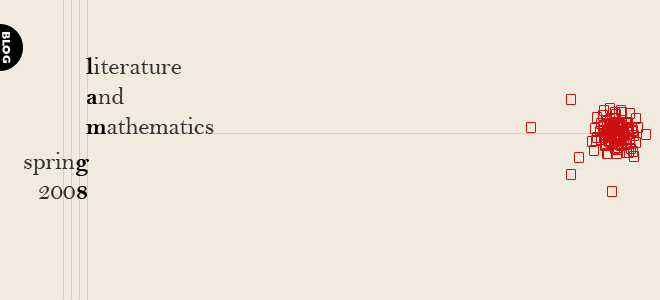The question has come up several times about the lack of Math relation in some of the work that we study. There was a time when I was looking all around to find math in literature and in movies or television. Obviously, I was quite unsuccessful in this search. I think everyone in this class is going to have to face the fact that the jury is pretty much out on how the general population feels about math. The reason that there is no math in pop culture is that it would never sell. A friend of mine who graduated as a math major a while back told me that she was really upset to see someone walking around with a shirt that said "I Hate Math". She noted that it is not as acceptable to "hate" other areas of understanding and she felt it was unfair. While I agree with her, I understand where the general population gets off thinking so harshly about math. Would ANY of you EVER want to take an intermediate algebra class even knowing what you know? That has got to be the most tedious think in the world. That is unfortunately the norm of math education though, mind numbing repetition. If (and I stress "if") you make it through the calculus sequence, you may gain an appreciation for the concepts and ideas that make math attractive and sexy, but you really have to endure a lot in order to get to this place. I think it might be better to invert the triangle so to speak and teach math conceptually first, and I guess that is one of the ideas of the "new math" but I think the consequence of that could be more math retards than ever before.
Thursday, February 28, 2008
Subscribe to:
Post Comments (Atom)

6 comments:
I think there is a great deal of math in pop culture.
Some Examples:
TV:
Numbers
CSI (sometimes)
Movies:
Pi
Beautiful Mind
21
I think you just ran the gammut. Not quite a "great deal" is it.
Math in popular culture is usually portrayed the same was as computer hacking: completely inaccurately. When math or hacking come to the big screen, they're treated as some kind of magic that involves lots of numbers and symbols flying all over the place.
I agree with you about math education, Ian. I always loved math, but I just about gave up on it during Algebra 2 in high school. 408D here at UT also just about ran me into the ground. Once I moved into the theory classes though, I remembered why I loved math in the first place. Hopefully one day soon we'll be able to improve this aspect of our education system.
Thank you, thank you for this post. It is definitely an accepted excuse to say, "I just can't do math." You never hear, "I just can't do this reading thing." Partly, it is the fault of the education system. Beginning math is dry. However, there are some intro classes that deal with infinity, cantor sets, and other cool concepts, and I think that is a more accurate representation of math. I just want to say that Ana and I noticed how poor our mental arithmetic has gotten. I haven't used numbers in my math classes in years. Which leads me to comment that all the examples given of math in pop culture do not, as I see it, really contain true math. Would a movie about Einstein be considered a physics movie? A Beautiful Mind is about a mathematician, but it doesn't really contain much math. I am not even going to start on Numbers...
Hey, I like math. I miss it actually. I passed my AP Calculus test in high school, which basically covered the math credits I needed for UT. However, I hate hate hate writing, like with a passion. I suppose I just appreciate the objectiveness of math compared to the subjectiveness of writing and rhetoric. Math follows rules and such and at the same time it can be challenging. Writing on the other hand is only as good as the viewer makes it out to be.
I agree that these examples aren't completely centered around math. But there are reasons for this. That sort of thing doesn't sell. I also don't see how television and film would add anything to the study of mathematics itself. The effect of these movies and shows is not education. But, rather, they create a certain interest in math for some. I was simply saying that these examples incorporate math in them in some way. As far as them not containing "true math"... I would like to know what "true math" is. Is Fermat's Last Theorem more "math-like" than the percentages that pop up during the World Series of Poker?
I guess my point is that math is everywhere underlying everything. Pop culture is no different.
Post a Comment